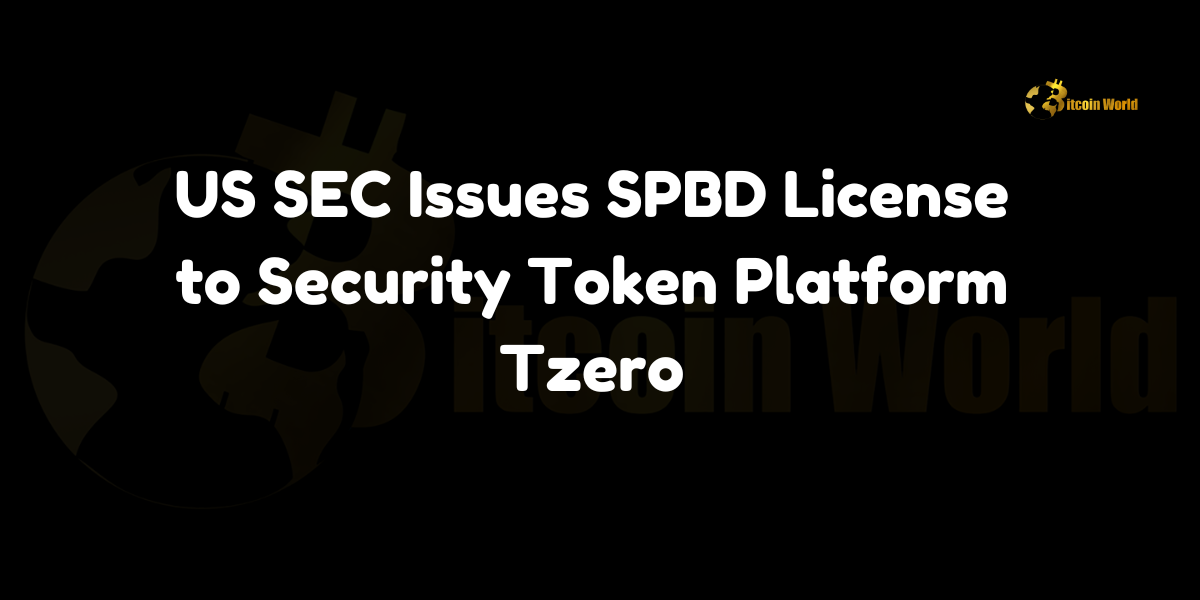Tzero, a security token platform, has received a Special Purpose Broker-Dealer (SPBD) license from the U.S. Securities and Exchange Commission (SEC), marking a significant step for the platform in the digital asset space. According to a report from The Block, this is only the second time the SEC has issued an SPBD license, following the digital asset platform Prometheum. The license allows Tzero to operate under the SEC’s regulatory framework, providing services related to security tokens.
The SPBD license is designed for firms dealing with digital assets classified as securities. Prometheum, the first platform to receive such a license, had also obtained approval from the Financial Industry Regulatory Authority (FINRA), enabling it to provide cryptocurrency clearing and settlement services through its SPBD designation. Tzero’s approval is seen as a pivotal moment for the regulation of digital assets in the U.S., but it also highlights ongoing tensions between regulators and the cryptocurrency industry.

SEC’s Controversial Approach to Crypto Regulation
While the SEC’s issuance of an SPBD license to Tzero marks progress for the security token industry, it is likely to spark controversy, particularly in light of previous criticisms surrounding Prometheum’s approval. Various cryptocurrency industry leaders and Republican lawmakers have raised concerns about Prometheum’s SPBD license, questioning the SEC’s process and motives. The controversy centers on the SEC’s insistence that cryptocurrency exchanges must register with the agency, while industry participants argue that such registration is impractical or impossible under the current regulatory framework.
The SEC has been clear in its stance that exchanges operating in the cryptocurrency space must comply with U.S. securities laws. However, leading cryptocurrency exchanges like Coinbase, Binance, and Kraken have faced legal challenges from the SEC, with all three indicted last year on charges of operating unregistered exchanges and broker-dealers. These actions have deepened the rift between the SEC and the cryptocurrency industry, as exchanges argue that the regulatory framework does not accommodate the unique nature of digital assets.
Tzero’s SPBD License: What It Means
The SPBD license issued to Tzero allows the platform to operate as a regulated broker-dealer for security tokens, bringing it under the SEC’s regulatory oversight. Tzero will be able to offer services related to the trading and settlement of digital assets that qualify as securities, providing a compliant framework for investors looking to engage in the security token market.
Tzero’s SPBD license is significant because it sets a precedent for other platforms seeking to operate in the regulated space of digital securities. As more digital assets are classified as securities, platforms like Tzero will be critical in offering compliant solutions for investors and issuers alike. By obtaining the SPBD license, Tzero demonstrates its commitment to working within the regulatory environment set by the SEC.
The approval also paves the way for the development of more security token offerings (STOs), allowing companies to tokenize traditional financial assets such as equity or real estate, creating new investment opportunities for a broader range of investors.
The Prometheum Controversy
While Tzero’s SPBD license is a significant development, it is unlikely to escape the controversy that has surrounded the SEC’s earlier issuance of a similar license to Prometheum. Many within the cryptocurrency industry have voiced concerns about Prometheum’s regulatory approval, questioning how it was able to secure both SEC and FINRA approvals so swiftly. These critics argue that the SEC’s actions appear selective and have raised doubts about whether the current regulatory framework is applied consistently across the industry.
Republican lawmakers have also expressed skepticism about Prometheum’s approval, suggesting that the SEC may be using the platform as an example to demonstrate compliance while targeting more established crypto exchanges with enforcement actions. These concerns have only deepened the divide between the SEC and the broader cryptocurrency community, with many industry participants calling for clearer, more practical regulations.
The Broader Impact on Cryptocurrency Regulation
Tzero’s SPBD license is likely to reignite discussions about the future of cryptocurrency regulation in the U.S. The SEC has been ramping up its efforts to regulate digital assets, insisting that exchanges dealing with securities must register with the agency. However, as the cases against Coinbase, Binance, and Kraken illustrate, many cryptocurrency exchanges believe that the current rules are incompatible with how they operate.
The issuance of SPBD licenses, while a step forward for security token platforms like Tzero, highlights the challenges facing the broader cryptocurrency ecosystem. As more digital assets fall under the definition of securities, platforms will need to decide whether to seek SPBD licenses or continue to operate under existing cryptocurrency frameworks. The growing regulatory scrutiny has led some companies to shift operations overseas, further complicating the relationship between U.S. regulators and the global cryptocurrency market.
To learn more about the innovative startups shaping the future of the crypto industry, explore our article on latest news, where we delve into the most promising ventures and their potential to disrupt traditional industries
Disclaimer: The information provided is not trading advice, Bitcoinworld.co.in holds no liability for any investments made based on the information provided on this page. We strongly recommend independent research and/or consultation with a qualified professional before making any investment decisions.




